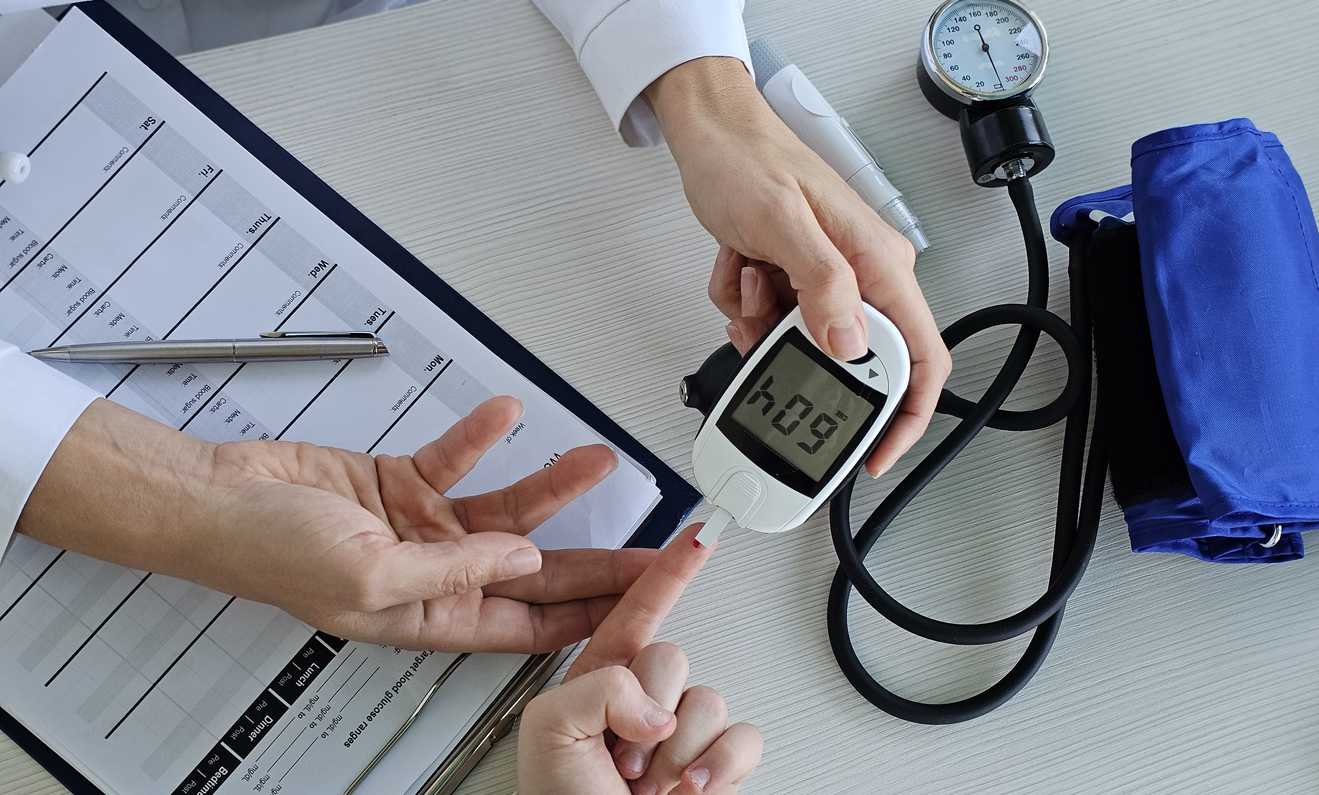Published May 11, 2025 | 9:00 AM ⚊ Updated May 11, 2025 | 9:00 AM

Diabetes prevalence in India has risen steadily, from about 9% (age-adjusted) in 2011 to projections of 10.8% by 2045.(Representational image/iStock)
Synopsis: Aimed at strengthening the National Programme for Non-Communicable Diseases, DIGI-CARE focuses on integrating digital solutions to improve the management of diabetes and hypertension in the public healthcare system. In Kerala, the project will be implemented in the Ernakulam district.
As Kerala sees a rise in blood sugar and blood pressure levels even as life expectancy soars, the state finds itself at the crossroads of a modern health paradox. To counter that, a national-level study spearheaded by the Indian Council of Medical Research (ICMR) is stepping in with a digital lifeline.
Titled DIGI-CARE, the ambitious project will become a testing ground for smart technologies and telemedicine solutions aimed at taming the state’s growing non-communicable disease (NCD) crisis — and possibly rewriting the playbook for public healthcare management.
The DIGI-CARE project (DIGItal technologies for optimising the Continuum of CARE for Diabetes and Hypertension Management in the Public Healthcare System in India) is an initiative nominated and sponsored by the ICMR.
Categorised under the National Health Research Priority Projects (NHRP), this multi-centric study is being simultaneously implemented in five states and one Union Territory — Rajasthan, Assam, Chhattisgarh, Himachal Pradesh, Kerala and Puducherry.
Aimed at strengthening the National Programme for Non-Communicable Diseases (NP-NCD), DIGI-CARE focuses on integrating digital solutions like telemedicine, mobile health applications and workflow optimisation to improve the management of diabetes and hypertension in the public healthcare system.
In Kerala, the project will be implemented in the Ernakulam district in collaboration with the Amrita Institute of Medical Sciences, Kochi.
The project involves a formative phase to assess existing gaps in digital adoption, co-design of interventions with stakeholders, implementation through Plan-Do-Study-Act (PDSA) cycles and a comprehensive evaluation of its effectiveness in enhancing clinical outcomes for patients with diabetes and hypertension (high blood pressure).
The project, backed by discussions between the Additional Chief Secretary of Kerala and the Director General of ICMR, will be carried out in close coordination with the Directorate of Health Services, the State Mission Directorate of NHM, and the district-level health machinery.
With patient privacy, data confidentiality, and ethical standards at its core, the study will leverage digital tools and community healthcare networks to enhance early detection, effective management, and patient-centred care for lifestyle diseases — aiming to set a replicable model for the rest of the state.
Kerala, often hailed for its impressive health indicators, is now grappling with an alarming NCD crisis. According to the ICMR’s India Diabetes (ICMR-INDIAB) study published in 2023, the state ranks third in the country for diabetes prevalence, with a staggering 23.6 percent of its population affected — trailing only Goa (26.4%) and Puducherry (26.3%).
Adding to the concern, 18.1 percent of Keralites are prediabetic, with nearly half expected to develop full-blown diabetes within five years.
Hypertension is an even graver concern, afflicting 44 percent of Kerala’s population — one of the highest rates in India, and notably uniform across both urban and rural regions. This is in sharp contrast to national averages of 11.4 percent for diabetes and 35.5 percent for hypertension.
Strikingly, rural Kerala is no safer: A 2019 study from central Kerala reported a rural diabetes prevalence of 20 percent, more than double the national rural average of eight percent, a phenomenon health experts call the “Kerala Paradox.”
Behind this surge, according to health experts, lies a rapid shift in lifestyle and socioeconomic patterns. Rising urbanisation, westernised diets, sedentary lifestyle, and the popularity of energy-dense, carb-heavy and sugar-laden food have drastically reshaped the state’s health landscape.
Obesity, a critical risk factor, is rampant, with 39.5 percent of Keralites exhibiting abdominal obesity — far above the national average of 28.6 percent.
Economic prosperity, high literacy and remittances from abroad have led to middle-income groups consuming more calories, fats and sugars than lower-income families, directly correlating with soaring rates of diabetes and hypertension.
The frequent coexistence of these conditions further compounds health risks, pushing Kerala towards a full-blown public health emergency. The numbers are clear, and the warning signs unmistakable — Kerala is staring at a non-communicable disease epidemic that threatens to undermine its famed health achievements.
With Kerala witnessing alarmingly high rates of diabetes and hypertension — much of it undiagnosed or poorly controlled — there’s an urgent need to strengthen the state’s non-communicable disease management framework.
It’s said that digital technologies hold immense promise in bridging existing gaps across the continuum of care, from early detection to effective disease control.
Mobile health apps, teleconsultation platforms, and digital monitoring tools can democratise access to timely and quality care, especially at lower-level health facilities grappling with capacity constraints.
“To build a truly responsive NCD program, it’s crucial to understand the barriers people face at every stage: From awareness of risk factors to treatment adherence. Studies have consistently shown that a large segment of the population remains unaware of their condition or struggles with uncontrolled disease despite being on treatment. Addressing this requires a multi-pronged strategy — leveraging digital tools to enhance screening, patient engagement, and continuous monitoring, while also fostering partnerships between public and private stakeholders,” said an official at the Directorate of Health Services.
(Edited by Muhammed Fazil.)

